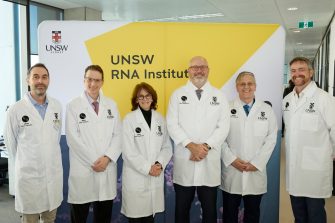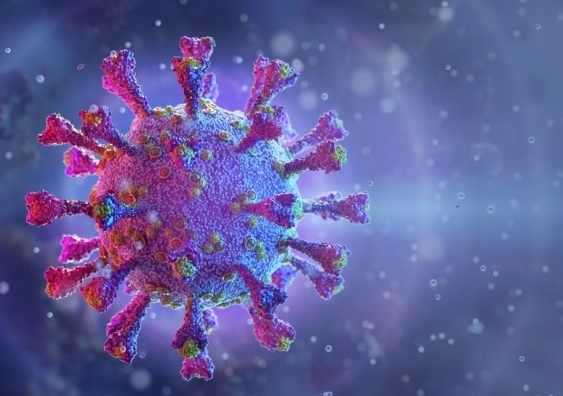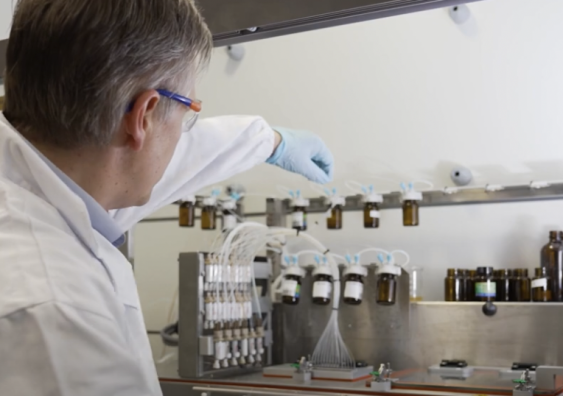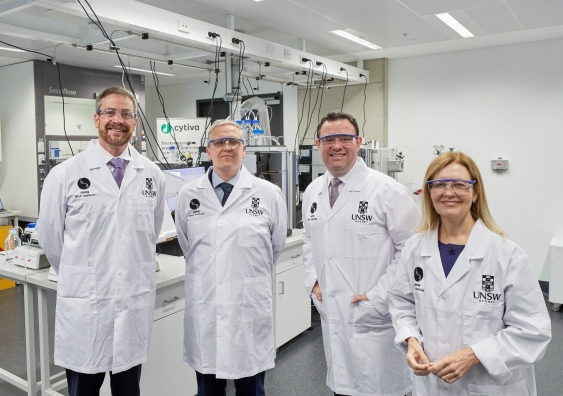UNSW partners with Therapeutics Innovation Australia to boost RNA ecosystem
2024-05-24T13:10:00+10:00

UNSW RNA Institute’s Dr Joshua Peterson, TIA CEO Dr Stuart Newman, Australia's Chief Scientist Dr Cathy Foley, Senator Tim Ayres, UNSW Professor Pall Thordarson, UNSW Vice-Chancellor and President Professor Attila Brungs.
Photo: UNSW Sydney
RNA science has significant potential to treat cancer genetic and autoimmune diseases, making critical contributions to advancing human health.
UNSW Sydney is partnering with Therapeutics Innovation Australia (TIA) as part of a new network established to support RNA research, development and commercialisation in Australia.
The TIA RNA Products Capability is a collaboration between TIA, UNSW, Monash University, the University of Western Australia and University of Queensland. The new capability is supported by the Australian government's National Collaborative Research Infrastructure Strategy (NCRIS).
The universities are the four foundational nodes or the ‘front doors’ to access RNA services and develop and manufacture cost-effective nucleic acids. The capability aims to bridge the gap between pre-clinical research and late-stage commercialisation.
The initiative builds on TIA’s track record, proven access models and supporting initiatives, translating successes into a national research infrastructure for the growing Australian mRNA industry.
Launching the network at the UNSW RNA Institute in Sydney on Friday, Assistant Minister for Trade and Manufacturing, Senator Tim Ayres acknowledged the important and central role of universities in RNA research and facing future challenges to society.
“RNA technology burst into the limelight in 2020 … with the advent of the RNA vaccines. It was a race against time,” he said.
“There was no certainty for policy makers that there would be a vaccine or a public health response of any substance to deal with the challenge that we faced.”
The UNSW Vice-Chancellor and President, Professor Attila Brungs, said UNSW was proud to be one of the four foundation nodes of the new network and looked forward to a productive and transformative collaboration.
“The work being done at the UNSW RNA Institute typifies our vision for positive societal impact by contributing to the translation of NSW bioscience into the products that will improve our health, and the quality of lives not only in Australia but right around the world,” Prof. Brungs said.
“These products are the vaccines and treatments for emerging diseases like COVID-19 but they also serve as advanced therapeutics for the complex challenges posed by cancers, infectious diseases, rare genetic disorders, and neurodegenerative conditions – all areas to be pioneered by the UNSW RNA Institute.”
The federal and NSW governments have both demonstrated their commitment to the next generation of research-led health interventions through significant support of the Australian RNA community to accelerate discoveries to the clinic and to market, Prof. Brungs said. “I would also like to acknowledge and thank both the federal and NSW governments for their genuine support for cutting-edge R&D facilities,” he said.
End-to-end RNA vaccine and therapeutics development
Dr Stuart Newman, TIA CEO, said TIA was proud to launch the new capability as it aligned with its goals of enabling end-to-end RNA vaccine and therapeutics development, fostering a productive pipeline for Australian researchers while adapting to the dynamic RNA ecosystem and NRI needs.
“We believe this new capability will support and feed into the investments made by governments and companies to establish onshore manufacturing by providing a rich pipeline of Australian IP,” Dr Newman said.
The Director of the UNSW RNA Institute, Professor Pall Thordarson, said the institute led the world in certain aspects of RNA research and product development.
“We are thrilled to be part of the TIA-led collaboration and look forward to building Australia’s RNA ecosystem,” he said.
The NSW government will provide additional support for the UNSW node which will go towards the upgrade of equipment and instruments, and business development and outreach activities that promote NSW as a leader in the research and development of RNA therapeutics.
The support was part of 10 NCRIS programs worth more than $15 million that the NSW government funded in the most recent NSW NCRIS Support Program round announced last week.
The RNA Accelerator is the core facility within the UNSW RNA Institute. It is Australia’s first ISO 9001 Certified facility for the ‘pilot-scale manufacture and design and development of new processes for RNA-based therapeutics and other products for pre-clinical studies’.
Media enquiries
For enquiries about this story and interview requests please contact Stefanie Menezes:
Tel: +61 (0)468 518 374
Email: s.menezes@unsw.edu.au






